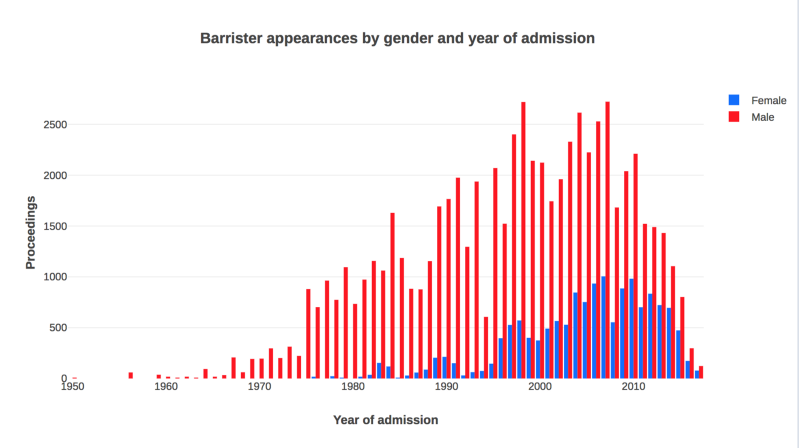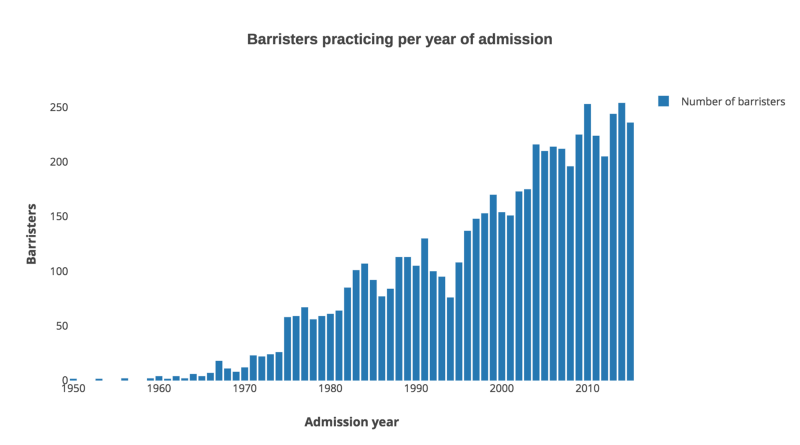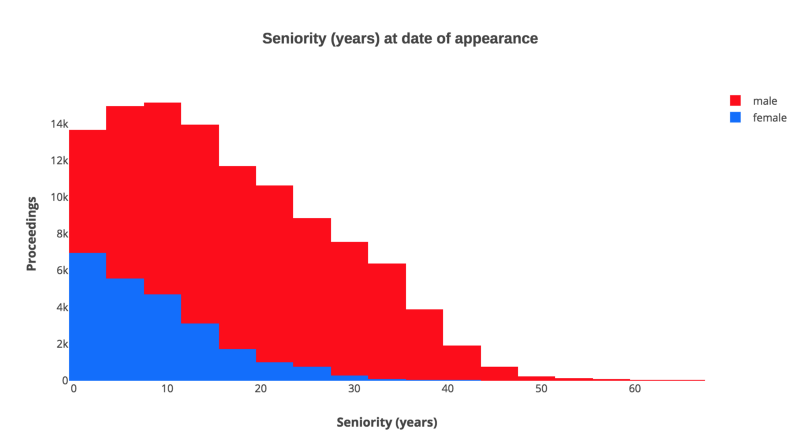When will I hit peak-busyness as a barrister?
Life at the bar is either a famine or a feast. This makes sense given the adversarial context in which most barristers operate. Clients want the best (for their price point), because second or third best (usually the barristers the clerk suggests after your first choices are unavailable), means losing. As a result, barristers are either very busy working, or busy pondering how to get busier.
When then is the average barrister's peak business? The answer, of course, depends. Obviously if you're a gun then it doesn't matter - we don't need data to know that the answer is that you'll be eating takeout dinner from your mahogany desk for a long time. But if you're not, then the following analysis based on appearances from 2008 onwards, may be enlightening.
Before I start, let me note a couple of caveats. First, barrister data is obtained from judgments and bar records from NSW and Victoria only (sorry Qld and WA and the other states, but it's Vic or NSW Bar or bust). So we don't have data on the many times barristers go to court to extend a deadline or to hand up consent orders, or data on barristers from other states. Second, it takes a while for a proceeding to reach judgment stage (ignoring interlocutory judgments). So if a baby barrister was helped to settle pleadings or draft an advice, but the trial were still years off, then because the appearance recorded on the judgment wouldn't show up until years later, it may seem as if that barrister has been sitting idle. (It's the reason we let barristers add cases on Litimetrics - it helps to inform the market about the work barristers are currently doing).
... barristers admitted in the mid 2000s, whether male or female, are currently enjoying the limelight ...
This chart shows that barristers admitted in the mid 2000s, whether male or female, are currently (as at the date of the data, up to about the middle of 2018) enjoying the limelight. For men, it's a pretty steady decline for the next 40 years or so, so don't get too comfortable. We can also see why the first few years of being a barrister can be rough. Solicitors think you're too green to be worth your $250/hour.
... female barristers are still only receiving 1/3 of briefs, even at the very junior level ...
Another story is that female barristers are still only receiving 1/3 of briefs, even at the very junior level. At the senior level, given the historic patterns of discrimination that resulted in there being fewer senior female barrister with equivalent experience to their male peers, the argument that there are not enough females with experience to support equality of briefing may be valid. But this doesn't hold in the context of briefing juniors, when men and women have the same experience (ie, almost none).
5 barristers per year of admission retire from practice every year
Chart 1 is, of course, limited because it presents data based on year of admission, when we know that about 5 barristers per year of admission retire from practice every year. It's obvious that as time goes on, there will be fewer barristers admitted in the 1970s getting briefs.
... the current disinclination to brief baby barristers is a relatively recent trend.
By plotting against seniority at time of appearance, rather than year of admission (which is, in effect, current seniority), we observe that the current disinclination to brief baby barristers is a relatively recent trend. In table 1, those admitted since 2015 received very few briefs. But Table 2 tells us that in the past 10 years or so, male baby barristers received as many briefs as those with 20–25 years' call.
Finally, let's go back to the question we first posed - at what seniority will barristers be the busiest? At present, it's 15 years for men and 7 years for women. In other words, it's at those seniorities that 50 per cent of appearances are by barristers with more seniority, and 50 per cent are by those with less seniority. One thing to note though is that these stats don't mean that it's probable that a male barrister with, say 15 years' call, will be increasingly quieter (having passed the median of 10 years). This is because of the decline in the overall number of barristers (from either gender) - if there are fewer barristers at a certain seniority, then it makes sense that barristers of that seniority will receive (as a group) a smaller share of the total briefs.



